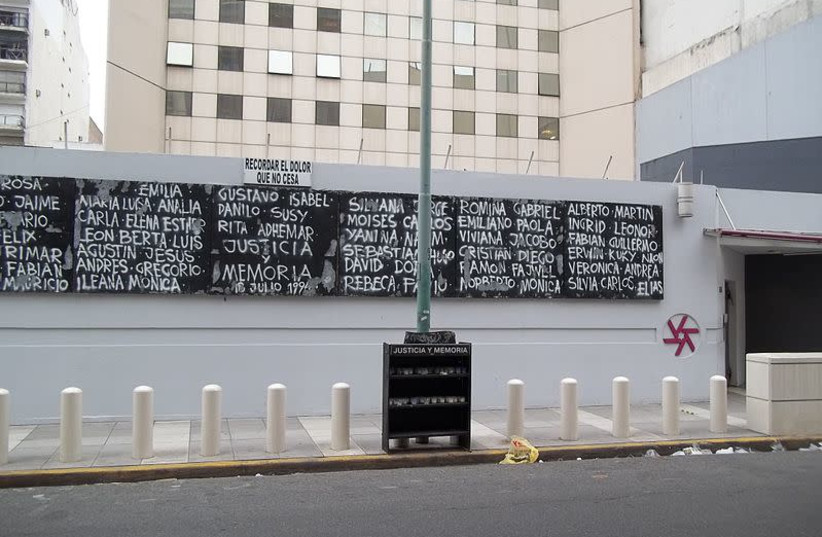Iran’s Islamic Revolutionary Guard Corps (IRGC) not only threatens global security, it also poses a particularly direct threat to Jewish communities in Europe and around the world. Amid growing calls on the European Union (EU) to blacklist the IRGC, EU foreign ministers gathering in Luxembourg on April 24 should take action and urgently designate the IRGC as a terrorist entity.
In the past six months, the EU and other European allies have sanctioned IRGC personnel and entities over human rights abuses in Iran and the regime‘s support for Russia’s brutal war in Ukraine. While the measures are both welcome and important, they are insufficient. Only a blanket EU ban on the IRGC will effectively put a check on Tehran’s state-sponsored terror.
Classified by the US in 2019 as a Foreign Terrorist Organization, the IRGC uses violence against civilians as a means to further its political goals – a textbook definition of a terrorist organization.
Created in the wake of the 1979 Islamic Revolution, the IRGC enforces the regime‘s extreme ideology in Iran and abroad. Equipped with its own military branches mirroring those of conventional armed forces, the IRGC reports directly to the Supreme Leader and carries the torch of ideological purity. Internally, the shock troops of the Basij paramilitary unit brutally quash dissent, while the expeditionary Quds Force operates a global enterprise of bombings, assassinations, abductions, money laundering and espionage.
The IRGC does not hide its anti-Jewish worldview. Indeed, its own training manuals for recruits explicitly prescribe violence against Jews and other minorities. Its Quds Force ominously bears the name Jerusalem, portending the regime‘s ultimate plans to eradicate Israel.

No mercy shown in the IRGC's history
The IRGC’s history is dotted with bloody attacks on civilians, including a deadly 1994 bombing of the AMIA Jewish community center in Buenos Aires. It also maintains proxy groups, like Lebanon’s Hezbollah and the Palestinian Islamic Jihad, both of which espouse the aim of annihilating the world‘s only Jewish state.
Prima facie, the IRGC’s terrorist activities coupled with its systematic targeting of Jewish life are an open-and-shut case for the designation as a terrorist organization.
Ostensibly, legal reasons stand in the way. EU foreign policy chief Josep Borrell said in January that a “court decision” is needed first. This standard seems to have been met. In 2017, a court in Berlin convicted a Pakistan-born IRGC spy for mapping Jewish targets for terror attacks.
WHAT‘S MORE, according to the EU, a competent authority of a member state or a third country can also serve as the basis of designation. The US Justice Department’s August 2022 indictment of IRGC operatives over plots to murder former secretary of state Michael Pompeo and former national security advisor John Bolton is a case in point.
There is no shortage of additional evidence to support the IRGC’s terror listing. Over the last five years alone, Iran has instigated over 30 terror plots in Europe. German authorities recently noted a sharp rise in the IRGC’s intelligence gathering of organizations and people involved in pro-Jewish and pro-Israeli goals, as well as a heightened threat specifically to Josef Schuster, head of the Central Council of Jews in Germany.
Earlier this year, German security services revealed IRGC terror plots on synagogues in the cities of Essen and Bochum. Just last month, the Mossad tipped off Greek authorities about an Iranian terror network that was making final preparations for a mass-casualty attack on a Jewish restaurant in Athens.
Relying on near-misses and close calls is not a viable strategy moving forward. EU sanctions would make it a criminal offense to be a member of the IRGC. The freezing of funds and travel restrictions would strengthen the hand of law enforcement to combat homegrown extremism and hamper the IRGC’s fundraising and operational capabilities.
While the legal case to blacklist the IRGC appears sound, the moral case for Europe to do the right thing is even stronger. As part of the EU’s commendable efforts to combat antisemitism and safeguard Jewish life, the Council of the European Union pledged to mainstream the prevention and countering of antisemitism in all its forms and across all policy areas, in December 2020. From this holistic standard should naturally flow a firm and decisive stance on the IRGC.
Spurred by the IRGC’s expanded operations at the EU’s doorstep in Ukraine, the EU Parliament in January – with near unanimity – urged the Council to ban the IRGC, a move also endorsed by EU Commission chief Ursula von der Leyen.
Key IRGC figures have taken note. Predictably, Tehran turned to its playbook of threats and intimidation. EU-sanctioned IRGC head Hossein Salami said in February, “We have the ability to increase the range of weapons and strike them seriously.”
Americans, for their part, have also weighed in. The bipartisan co-chairs of the Transatlantic Friends of Israel (TFI), United States Representatives Andrew Garbarino (R-NY) and Brad Schneider (D-IL), spearheaded an interparliamentary statement in December 2022, urging the EU to blacklist the IRGC. Building on this effort this month, a bipartisan letter in Congress called on the EU to blacklist the IRGC and a newly introduced resolution urges the Biden administration to prioritize the issue in talks with European leaders.
The EU has impressively shown its dedication to defending its core values, among other ways, by leading in the fight against global antisemitism. Expeditiously imposing the full force of its sanctions regime on the IRGC is the logical next step and a moral imperative.
